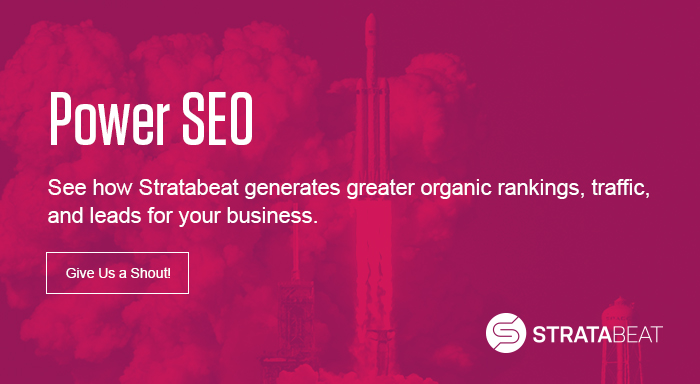How to Generate 3X More Traffic From Your Google Rankings

It’s no secret that SEO is one of the most cost-effective ways to generate new leads. If you can climb to the first page of Google rankings for a keyword closely related to your offerings, you can attract a significant amount of organic traffic. And with the right hook, you can convert that organic traffic into leads.
But like most good things in life, achieving B2B SEO results isn’t necessarily easy. With so many companies fighting for the same set of keywords, it can be tough to battle through all the competition and still come out the king of the Google hill.
The simple truth is that SEO requires a lot of work. There’s no getting around that. And SEO doesn’t produce flash-in-the-pan results. It takes time to build domain authority, time for SEO to begin working effectively, and time for Google to recognize your authoritativeness.
So what’s a company to do to more efficiently generate SEO results?
There is one method that is low-hanging fruit and allows you to take a shortcut to generating better Google rankings. Using this method, you can 2X or even 3X your traffic from SEO.
Start Strong, Finish Stronger
So what is this magical SEO method for climbing the Google rankings? It’s not that complicated.
Start where you’re already strong in organic search and then expand with that as your foundation.
In other words, if you’re already achieving Google page one results for a target keyword phrase, use that as your SEO starting point and expand incrementally from there with related terms.
Think of it this way. Let’s say you’re a phenom in tennis. You’re the second coming of Serena Williams. Because you’re so strong in tennis, it should be relatively easy for you to start playing squash, racquetball, or even ping pong. Because you’re so strong in tennis, it wouldn’t be long before you were crushing the competition in all these related sports.
Now let’s flip the analogy a bit. If you tried to go from tennis to rock climbing or football, that would probably be significantly more difficult. In fact, you could be a complete failure.
This is almost precisely what happened to Michael Jordan when he tried to switch from playing basketball to baseball. He is, arguably, the greatest basketball player of all time, but on the baseball diamond, he was mediocre. (Sorry, Michael! But it’s true…)
Now, let’s take this principle of related proximity and use it to attain better Google rankings, faster and easier.
Stronger, Faster, Better SEO
Ready to Increase Your Organic Traffic? Book a Strategy Call
Step #1: Identify The Keywords Where You’re Already On Google Page One
The first step in this process is to determine which keywords you’re already ranking on page one for. Ideally, these should be keywords that are closely related to your business.
For example, Stratabeat is on Google page one for a number of B2B marketing, content marketing, blogging, and branding keywords. On the other hand, we have one particular post on mind mapping that attracts a significant amount of organic traffic (over 80,000 unique page views), as well. The problem is that the topic of mind mapping doesn’t generate many leads for us. So we don’t focus on that keyword when building out our content or SEO strategy.
You want to focus on keywords that are closely related to your business and have the potential to generate leads. Mountains of leads.
To determine the keywords you currently rank for, consider using a tool like Ahrefs, Accuranker, KWFinder or Semrush.
Step #2: Develop An Ecosystem of Related Keywords
Once you’ve determined the most important keywords that you rank for, you need to develop an ecosystem of related keywords. In other words, you’re going to gather together as many keywords as possible that are related to your primary keywords.
For example, let’s say you rank on page one for the term “email marketing.”
Related terms might include:
- Email marketing providers
- Email marketing software
- Email campaigns
- Drip campaign
- Email automation
- Email marketing templates
- Email marketing best practices
- Etc.
Why should you develop this system of related keywords?
Because Google already sees you as an authority in your primary keyword.
They rank you on page one, which indicates that you’re trustworthy and authoritative in Google’s eyes.
By focusing on related keywords, you’re reinforcing to Google that this really is your authoritative space. It’s your domain of expertise. And, because you’re already an authority on one keyword, it’s much more likely that Google will see you as an authority on related keywords as well.
Step #3: Create Content Around Your Related Keywords
Once you’ve identified your related keywords, it’s time to start creating high-value, authoritative content surrounding those keywords.
The options are almost endless for creating content related to your keywords.
At the top of the funnel, you may want to crank out a lot of broad, educational content. This often comes in the form of blog posts or articles.
In the middle of the funnel, you want to narrow your focus and start tying topics to your solutions. Webinars, videos, and presentations are really great for this.
Lower in your funnel, you may want to include tools such as a calculator (ROI calculator, etc.). Not only will this generate organic traffic, but it also presents you with an opportunity to collect leads by requiring their email as part of the process.
Want even more Google ranking results that are low-hanging fruit? Build your content in different formats. Create data visualizations, videos, podcasts, reports, whitepapers, executive briefings, blog posts, webinars, case studies, use cases, etc. By creating content in all these different formats, you attract backlinks from other websites, which signal to Google that your content is authoritative. You also generate social shares, which aren’t technically an SEO ranking signal but still generate incremental traffic.
Stratabeat Recently Helped a Client Achieve a 3,151% Increase in Organic Blog Traffic
Ready to Ramp Up Your SEO Results? Book a Strategy Call
The Google Rankings Ecosystem
It’s important to understand that Google sees the internet as one big ecosystem. Google doesn’t only look at your website to determine whether you’re an authority on a subject. They also look at what you’ve posted on YouTube, SlideShare, byline articles on other websites, and just about any other content you create. All these things are related to each other and are considered by Google.
The implication is that if Google sees you as an authority on “business valuation” because of business valuation-related content you’ve posted on your web pages and blog, as well as the backlinks you’ve earned to those pages, then it’s also probably going to recognize your authority when you start talking about “business valuation” on SlideShare, YouTube, Twitter, podcasts, company news, industry websites, etc.
The point is that it’s much easier to earn high Google rankings through keywords related to your page one keywords. On the flip side, trying to rank for an unrelated keyword will be much more difficult. For example, in our “business appraisals” example, ranking for “accounting services” or “CPA services” will be much harder since you’re not already an authority in those subjects.
Pick The Low-Hanging Fruit
Whatever SEO route you take, you’ll have to put in the work in order to achieve strong Google rankings. But your work will be much more effective if you pick the low-hanging fruit first. If you want to 3X the organic traffic you generate, start by identifying where you’re already on Google page one and then build out from that foundation.
You’ll get results much faster with less effort, which makes everyone happy.
To quote Michael Scott from The Office, that’s what we call a “win-win-win”.
This post was originally published on July 23, 2019, and was last edited on September 28, 2021.



